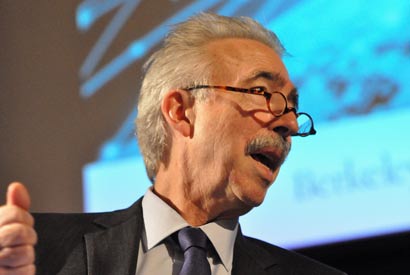Transcript extra: Academic interests
Excerpt of transcript of video chat with incoming UC Berkeley Chancellor Nicholas Dirks, on his academic interests.

November 27, 2012
Transcript of an excerpt of a video conversation between UC Berkeley’s next chancellor, Nicholas Dirks, and Dan Mogulof of Berkeley’s Office of Public Affairs:
DAN MOGULOF: I want to talk about something that I know is near and dear to your heart and that’s your — your own academic interests, the intellectual pursuits that have been at the center of your life for so long. What is it exactly that you study and research? Talk to us a little bit about that.
NICHOLAS DIRKS: Well, I went off to India when I was a student at Wesleyan University as an undergraduate and began a research project that I’ve continued to the present day. What I was doing then for a senior thesis was to write about Gandhi and his work in South India. I studied Tamil, which is the language spoken in the southernmost region of the subcontinent, and I realized that Gandhi had had a somewhat difficult relationship with some people in South India because of the positions he took on the question of caste. I followed that, and I worked on Gandhi’s own writings about caste, among other things, worked on his role in the nationalist movement, but then I got interested in caste itself.
I have spent years studying different aspects of the caste system, both in ethnographic work that I did in a very small town in Southern India and in libraries and archives in major cities in India, also in London and England. And through this work, I’ve come to take on the question of what the history of caste really is. What and how did this system of social organization develop? What happened to it before, say, British colonialism became a major historical force in South Asia? And what happened while the British were there ruling the subcontinent? And what has happened after independence? Is caste still the predominant social formation? Is it something that is relevant anymore now that there are big cities and global capitalism and major market activity? Does caste matter anymore? Is it just something that was left behind in the village and the like?
And through all the work that I’ve done, including up to the present day, I’ve been interested in how on the one hand, caste has changed over time and is hardly a single institution that has remained unchanged by dint of historical influence and circumstance, But on the other, how caste continuously reminds us of some of the ways in which social organization in places like India continue to legitimate inequality.
And as a social scientist concerned with questions of inequality, I’ve been a participant in different kinds of conversations taking place within India around the role of caste in, say, affirmative action there, about the importance of thinking through questions of access vis-à-vis the question of caste. At the same time — that — I believe that caste is going to continue to change and it will change in a way that will ultimately reflect the changing needs of Indian society, which will include a commitment to social equality across the board.